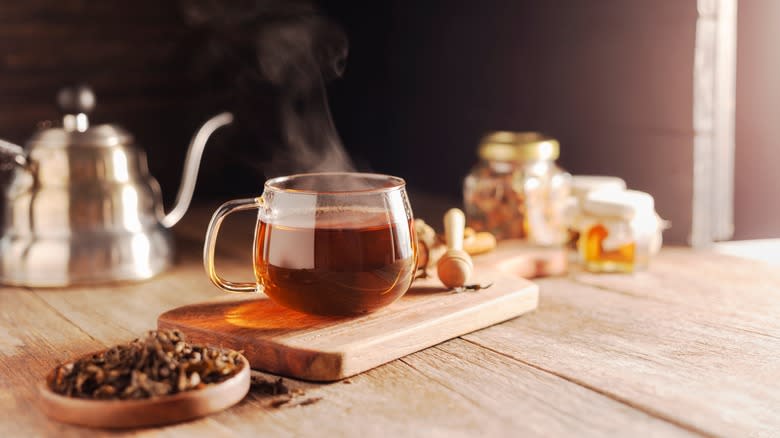The Unexpected Red Wine Substitute That's Hiding In Your Pantry

A splash of red wine is an easy shortcut for bringing body and flavor to any dish. It has a slightly sweet taste, with a hint of spice or woodiness that brings depth. Cooking certain dishes without red wine may seem unthinkable, but when the wine rack is bare black tea makes a surprisingly worthy substitute.
If you're trying to relax after a stressful day, a steaming cup of tea doesn't bring the same effect a glass of vino does. With cooking, however, the two are quite similar. Aside from the boozy taste, red wine is filled with tannins, a bitter compound that gives wine — and thus food — its flavor. Tannins play a crucial role in red wine, giving it body and texture, balancing the flavors, and leaving that dry texture that lingers in your mouth after a sip of wine. When your steak with red wine mushrooms has infinitely more flavor than fungi sans wine, that's thanks to tannins.
The compounds naturally occur in other foods and drinks, most notably in black tea. Tannins play a similar role in black tea, lending it a slightly bitter and extremely earthy taste. Like red wine, black tea has the most tannins among teas, so you don't have to worry about a lack of flavor when making the switch. However, cooking with tea does require a more concentrated flavor than sipping it, so don't be afraid to brew it for much longer.
Read more: Vinegar Cooking Hacks You'll Wish You Knew Sooner
How To Swap Red Wine For Black Tea In Recipes

Red wine is slightly more acidic than black tea, so you'll need a splash of vinegar to compensate for the taste. White distilled vinegar works in a pinch, but red wine vinegar is the best choice thanks to the fruity punch it gives food. After steeping the tea, wait for it to cool down before stirring in a teaspoon or two of vinegar. Once the tea is cool, you can use it just like how you would use wine — to marinate meat, braise some vegetables, or add it to your stews and soups.
If you rely on red wine for its specific flavor, you can opt for flavored black tea to mimic that. For red wine-braised short ribs, for example, a dry red wine like Zinfandel or Cabernet Sauvignon works well. Both have rich, fruity flavors of plums, blackberries, cherries, and blackcurrants, balanced by woodsy herbs and spices like star anise, cinnamon, and tobacco. Rather than using regular black tea, use a blend of blackberry or cherry black tea with a few bags of nutmeg or cinnamon black tea.
Pinot noir is commonly used in beef stews or hearty mushroom bourguignon, but if you don't have it, cherry or raspberry black tea is a solid replacement. You can brew them together with vanilla black tea or add cinnamon and cloves to the water while steeping.
Read the original article on Tasting Table